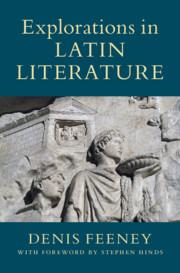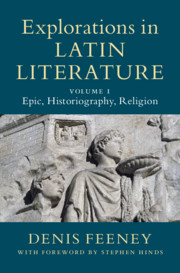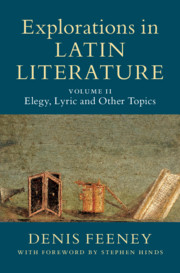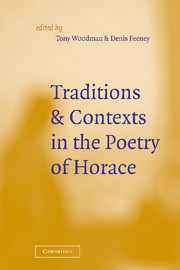Explorations in Latin Literature 2 Hardback Volume Set
Denis Feeney is one of the most distinguished scholars of Latin literature and Roman culture in the world of the last half-century. These two volumes conveniently collect and present afresh all his major papers, covering a wide range of topics and interests. Ancient epic is a major focus, followed by Latin lyric, historiography and elegy. Ancient literary criticism and the technology of the book are recurrent themes. Many papers address the problems of literary responses to religion and ritual, with an interdisciplinary methodology drawing on comparative anthropology and religion. The transition from Republic to Empire and the emergence of the Augustan principate form the background to the majority of the papers, and the question of how literary texts are to be read in historical context is addressed throughout. All quotations from ancient and modern languages have now been translated and Stephen Hinds has contributed a Foreword.
- Covers a wide range of ancient literature, showcasing a variety of theoretical approaches
- Shows how ancient texts can benefit from an interdisciplinary perspective that goes beyond formal analysis
- Illuminates how discussion and debate within classics has evolved in the last generation
Product details
October 2021Multiple copy pack
9781108668200
800 pages
229 × 152 mm
Temporarily unavailable - available from TBC
Table of Contents
- Volume I. Introduction
- 1. The Taciturnity of Aeneas
- 2. The Reconciliations of Juno
- 3. Epic Hero and Epic Fable
- 4. Stat magni nominis umbra: Lucan on the Greatness of Pompeius Magnus
- 5. History and Revelation in Virgil's Underworld
- 6. Following after Hercules, in Apollonius and Virgil
- 7. Beginning Sallust's Catiline
- 8. Leaving Dido: The Appearance(s) of Mercury and the Motivations of Aeneas
- 9. Epic Violence, Epic Order: Killings, Catalogues, and the Role of the Reader in Aeneid
- 10. Mea tempora: Patterning of Time in Ovid's Metamorphoses
- 11. Interpreting Sacrificial Ritual in Roman Poetry: Disciplines and their Models
- 12. Tenui…Latens Discrimine: Spotting the Differences in Statius' Achilleid
- 13. On not Forgetting the 'Literatur' in 'Literatur und Religion'
- 14. Virgil's Tale of Four Cities: Troy, Carthage, Alexandria and Rome
- 15. First Similes in Epic
- 16. Fictions of Citizenship in Livy's History. Volume II.� Introduction
- 1. Si licet et fas est: Ovid's Fasti and the Problem of Free Speech under the Principate
- 2. 'Shall I compare thee ...?' Catullus 68 and the Limits of Analogy
- 3. Towards an Account of the Ancient World's Concepts of Fictive Belief
- 4. Horace and the Greek Lyric Poets
- 5. Criticism Ancient and Modern
- 6. The Odiousness of Comparisons: Horace on Literary History and the Limitations of Synkrisis
- 7. Vna cum scriptore meo: Poetry, Principate, and the Traditions of Literary History in the Epistle to Augustus
- 8. Two Virgilian Acrostics: Certissima signa? (with Damien Nelis)
- 9. Catullus and the Roman Paradox Epigram
- 10. Becoming an Authority: Horace on his Own Reception
- 11. Fathers and Sons: The Manlii Torquati and Family Continuity in Catullus and Horace
- 12. Doing the Numbers: The Roman Mathematics of Civil War in Shakespeare's Antony and Cleopatra
- 13. Crediting Pseudolus: Trust, Belief, and the Credit Crunch in Plautus' Pseudolus
- 14. Hic finis fandi: On the Absence of Punctuation for the Endings (and Beginnings) of Speeches in Latin Poetic Texts
- 15. Representation and the Materiality of the Book in Catullus' Polymetrics
- 16. Catullus 61: Epithalamium and Comparison
- 17. Ovid's Ciceronian Literary History: End-Career Chronology and Autobiography
- 18. Horace and the Literature of the Past: Lyric, Epic, and History in Odes 4
- 19. Forma manet facti (Ov. Fast. 2.379): Aetiologies of Myth and Ritual in Ovid's Fasti and Metamorphoses.






